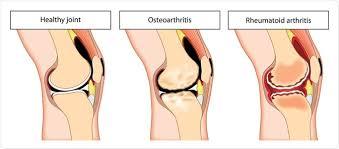Understanding Rheumatoid Arthritis (RA) and Ulcerative Colitis (UC): Two Chronic Inflammatory Diseases

Chronic inflammatory diseases like Rheumatoid Arthritis (RA) and Ulcerative Colitis (UC) are conditions that can severely impact an individual’s quality of life. Though distinct in their symptoms and areas of impact, both RA and UC share an underlying mechanism of inflammation and can co-occur in some patients. Understanding these conditions, their symptoms, causes, and treatments is crucial for managing them effectively.
In this blog, we’ll explore the key aspects of Rheumatoid Arthritis and Ulcerative Colitis, highlighting their similarities and differences, and discuss how these conditions can be treated and managed.
What is Rheumatoid Arthritis (RA)?
Rheumatoid Arthritis (RA) is a chronic autoimmune disorder that primarily affects the joints. The immune system mistakenly attacks the synovium, the lining of the membranes surrounding the joints. This causes inflammation, pain, stiffness, and swelling in the affected joints. Over time, this can lead to joint damage and deformities.
RA is typically a systemic condition, meaning it can affect not only the joints but also other parts of the body, such as the skin, lungs, and eyes. While the exact cause of RA remains unknown, genetics, environmental factors, and hormonal imbalances are believed to play a role.
Symptoms of RA:
-
Joint pain, especially in the morning
-
Swelling, tenderness, and redness around the joints
-
Stiffness, particularly in the hands, wrists, and knees
-
Fatigue and weakness
-
Deformities in advanced stages
RA often affects both sides of the body symmetrically (e.g., both wrists or both knees) and tends to affect smaller joints first, such as those in the fingers and toes.
What is Ulcerative Colitis (UC)?
Ulcerative Colitis (UC) is a type of inflammatory bowel disease (IBD) that affects the colon and rectum. It is a chronic condition in which the immune system attacks the lining of the colon, leading to inflammation, ulcers, and sores. This results in symptoms such as diarrhea, abdominal pain, and rectal bleeding.
UC is also classified as an autoimmune condition, where the body’s immune system mistakenly attacks the intestines. While the exact cause of UC remains unclear, environmental and genetic factors are believed to contribute to its onset. It is most commonly diagnosed in people between the ages of 15 and 30, though it can develop at any age.
Symptoms of UC:
-
Abdominal pain and cramping
-
Diarrhea, often with blood or mucus
-
Fatigue
-
Weight loss
-
Rectal bleeding
-
Urgency to have bowel movements
UC symptoms can range from mild to severe, with flare-ups occurring at irregular intervals. In some cases, UC can lead to serious complications, such as dehydration, nutritional deficiencies, or increased risk of colon cancer.
Common Features and Differences Between RA and UC
Although RA and UC are separate conditions affecting different parts of the body, they share certain commonalities:
-
Inflammation: Both RA and UC involve inflammation as a central factor, though RA affects the joints and UC affects the gastrointestinal tract.
-
Autoimmune Nature: Both conditions are considered autoimmune disorders, where the immune system attacks healthy tissues in the body.
-
Chronic and Relapsing: Both conditions are chronic, meaning they persist over time. Symptoms can fluctuate, with periods of flare-ups followed by remissions.
However, there are key differences:
-
Areas Affected: RA primarily affects the joints, while UC affects the colon and rectum.
-
Symptoms: RA symptoms are focused on joint pain, swelling, and stiffness, while UC symptoms mainly involve gastrointestinal issues like diarrhea and abdominal pain.
Managing Rheumatoid Arthritis and Ulcerative Colitis
Both RA and UC are chronic conditions, and while there is no cure, there are effective treatments to manage symptoms and improve quality of life.
Managing Rheumatoid Arthritis (RA):
-
Medications: Common treatments for RA include NSAIDs (Non-Steroidal Anti-Inflammatory Drugs) for pain relief, disease-modifying antirheumatic drugs (DMARDs) to slow the progression of the disease (e.g., methotrexate), and biologics to target specific components of the immune system.
-
Physical Therapy: Exercise and physical therapy help maintain joint mobility and prevent deformities.
-
Surgery: In advanced cases, surgical intervention such as joint replacement may be necessary.
Managing Ulcerative Colitis (UC):
-
Anti-inflammatory Medications: Drugs like aminosalicylates and corticosteroids help reduce inflammation in the colon.
-
Immunosuppressive Drugs: Medications like thiopurines and biologics (e.g., infliximab) suppress the immune system’s overactivity and can help control flare-ups.
-
Dietary Changes: A well-balanced diet that avoids triggers like dairy, high-fat foods, and spicy foods can help manage UC symptoms.
-
Surgery: In severe cases, surgical removal of the colon (colectomy) may be necessary.
The Importance of Monitoring and Regular Check-ups
Both RA and UC require ongoing monitoring and medical care. Regular check-ups with your healthcare provider can help assess disease progression, adjust medications, and manage flare-ups. Blood tests, imaging studies, and colonoscopies are important for tracking the health of joints, the gastrointestinal system, and overall well-being.
Conclusion
Rheumatoid Arthritis (RA) and Ulcerative Colitis (UC) are both serious autoimmune conditions that involve chronic inflammation but affect different parts of the body. While RA primarily impacts the joints, UC affects the colon and rectum. Both conditions can significantly impact daily life but can be managed effectively with a combination of medications, lifestyle changes, and regular medical monitoring.
If you experience symptoms of either RA or UC, seeking prompt medical attention is important for effective treatment and better management of these chronic diseases. Working closely with a healthcare provider will help ensure the best possible outcomes and improve quality of life.
- Art
- Causes
- Crafts
- Dance
- Drinks
- Film
- Fitness
- Food
- Spellen
- Gardening
- Health
- Home
- Literature
- Music
- Networking
- Other
- Party
- Religion
- Shopping
- Sports
- Theater
- Wellness



